Void Contracts and Business Law: A Case Study Analysis
VerifiedAdded on 2023/06/12
|7
|2123
|267
Case Study
AI Summary
This case study examines a contract dispute between Wayne and Michelle, former business partners, concerning a debt acknowledgement deed containing a significant error. The analysis focuses on whether the contract is valid, the extent of Wayne's liability, and potential remedies for Michelle. It delves into contract law principles, including offer, acceptance, consideration, and the impact of vitiating factors like mistake. The study concludes that while a valid contract was initially formed, a unilateral mistake regarding the debt amount renders it voidable. Despite the voided contract, Wayne remains liable for the original debt, and Michelle can pursue legal action to recover the outstanding amount. Desklib provides students with access to similar case studies and solved assignments.
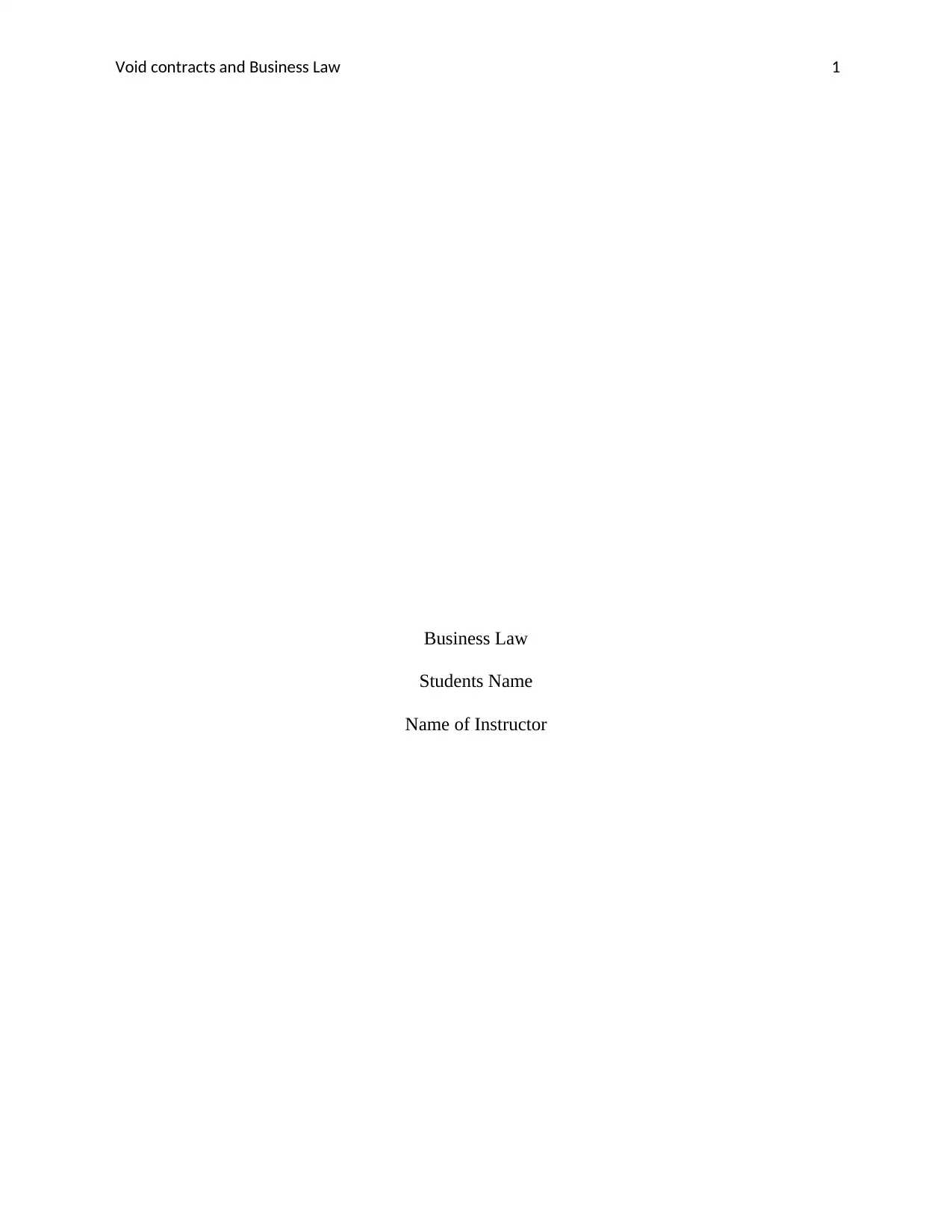
Void contracts and Business Law 1
Business Law
Students Name
Name of Instructor
Business Law
Students Name
Name of Instructor
Paraphrase This Document
Need a fresh take? Get an instant paraphrase of this document with our AI Paraphraser
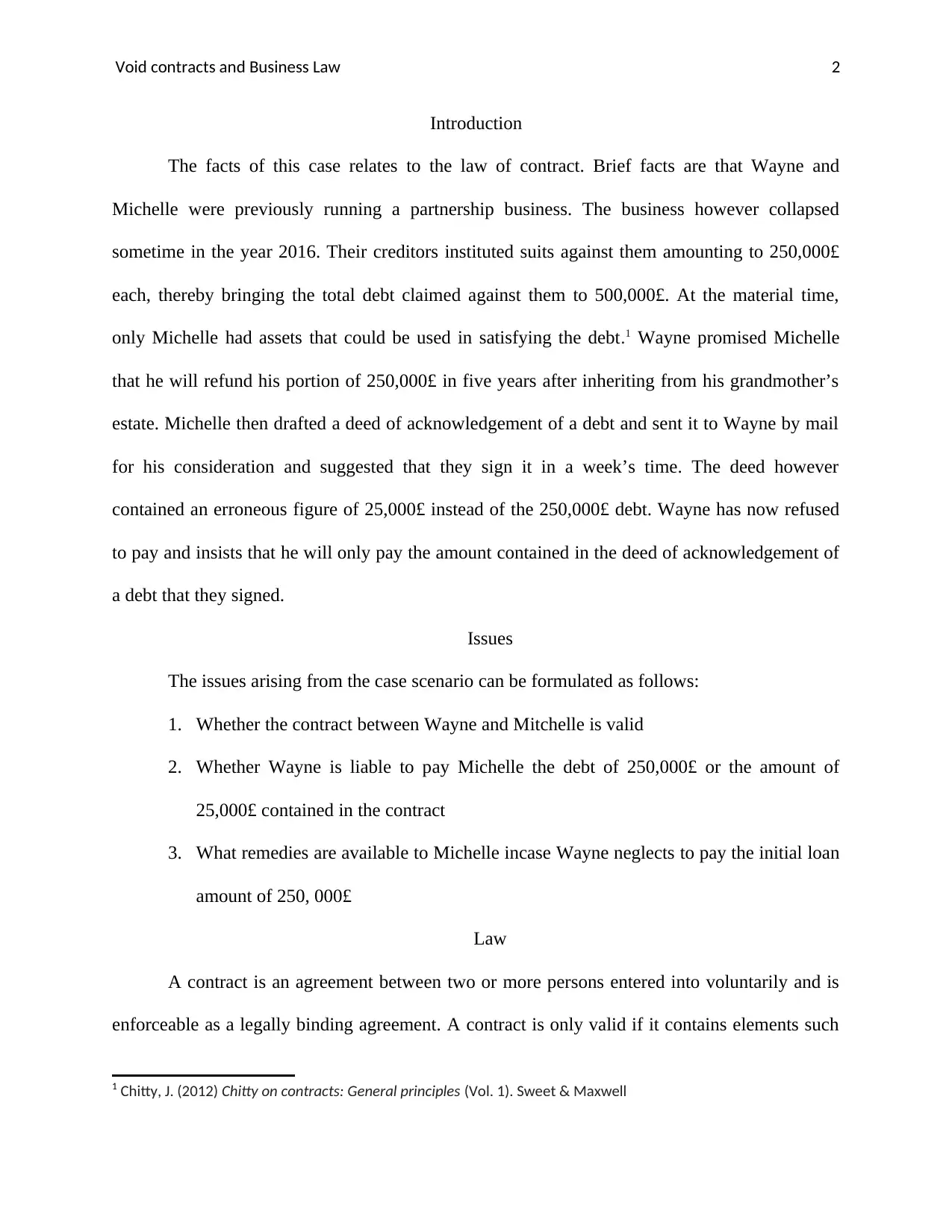
Void contracts and Business Law 2
Introduction
The facts of this case relates to the law of contract. Brief facts are that Wayne and
Michelle were previously running a partnership business. The business however collapsed
sometime in the year 2016. Their creditors instituted suits against them amounting to 250,000£
each, thereby bringing the total debt claimed against them to 500,000£. At the material time,
only Michelle had assets that could be used in satisfying the debt.1 Wayne promised Michelle
that he will refund his portion of 250,000£ in five years after inheriting from his grandmother’s
estate. Michelle then drafted a deed of acknowledgement of a debt and sent it to Wayne by mail
for his consideration and suggested that they sign it in a week’s time. The deed however
contained an erroneous figure of 25,000£ instead of the 250,000£ debt. Wayne has now refused
to pay and insists that he will only pay the amount contained in the deed of acknowledgement of
a debt that they signed.
Issues
The issues arising from the case scenario can be formulated as follows:
1. Whether the contract between Wayne and Mitchelle is valid
2. Whether Wayne is liable to pay Michelle the debt of 250,000£ or the amount of
25,000£ contained in the contract
3. What remedies are available to Michelle incase Wayne neglects to pay the initial loan
amount of 250, 000£
Law
A contract is an agreement between two or more persons entered into voluntarily and is
enforceable as a legally binding agreement. A contract is only valid if it contains elements such
1 Chitty, J. (2012) Chitty on contracts: General principles (Vol. 1). Sweet & Maxwell
Introduction
The facts of this case relates to the law of contract. Brief facts are that Wayne and
Michelle were previously running a partnership business. The business however collapsed
sometime in the year 2016. Their creditors instituted suits against them amounting to 250,000£
each, thereby bringing the total debt claimed against them to 500,000£. At the material time,
only Michelle had assets that could be used in satisfying the debt.1 Wayne promised Michelle
that he will refund his portion of 250,000£ in five years after inheriting from his grandmother’s
estate. Michelle then drafted a deed of acknowledgement of a debt and sent it to Wayne by mail
for his consideration and suggested that they sign it in a week’s time. The deed however
contained an erroneous figure of 25,000£ instead of the 250,000£ debt. Wayne has now refused
to pay and insists that he will only pay the amount contained in the deed of acknowledgement of
a debt that they signed.
Issues
The issues arising from the case scenario can be formulated as follows:
1. Whether the contract between Wayne and Mitchelle is valid
2. Whether Wayne is liable to pay Michelle the debt of 250,000£ or the amount of
25,000£ contained in the contract
3. What remedies are available to Michelle incase Wayne neglects to pay the initial loan
amount of 250, 000£
Law
A contract is an agreement between two or more persons entered into voluntarily and is
enforceable as a legally binding agreement. A contract is only valid if it contains elements such
1 Chitty, J. (2012) Chitty on contracts: General principles (Vol. 1). Sweet & Maxwell
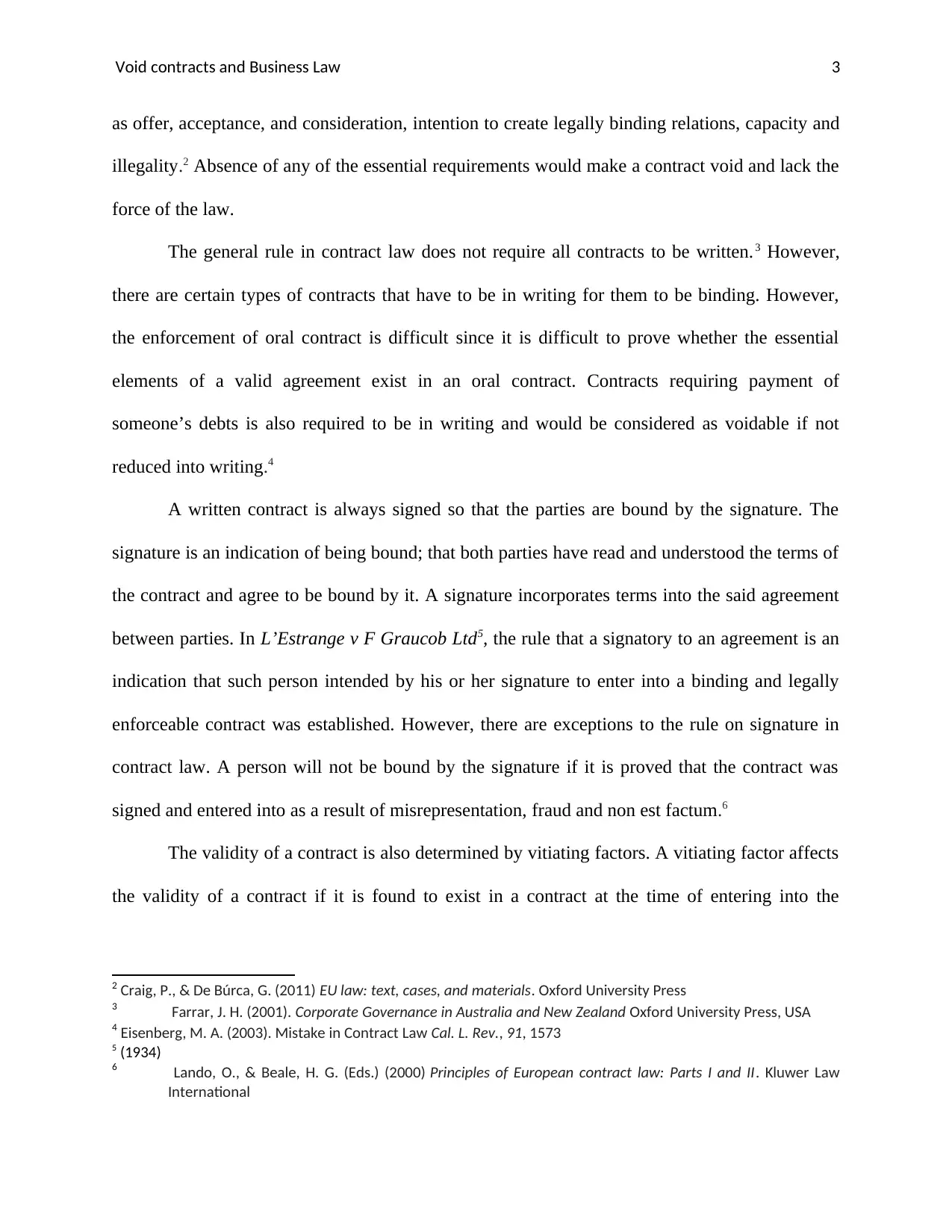
Void contracts and Business Law 3
as offer, acceptance, and consideration, intention to create legally binding relations, capacity and
illegality.2 Absence of any of the essential requirements would make a contract void and lack the
force of the law.
The general rule in contract law does not require all contracts to be written.3 However,
there are certain types of contracts that have to be in writing for them to be binding. However,
the enforcement of oral contract is difficult since it is difficult to prove whether the essential
elements of a valid agreement exist in an oral contract. Contracts requiring payment of
someone’s debts is also required to be in writing and would be considered as voidable if not
reduced into writing.4
A written contract is always signed so that the parties are bound by the signature. The
signature is an indication of being bound; that both parties have read and understood the terms of
the contract and agree to be bound by it. A signature incorporates terms into the said agreement
between parties. In L’Estrange v F Graucob Ltd5, the rule that a signatory to an agreement is an
indication that such person intended by his or her signature to enter into a binding and legally
enforceable contract was established. However, there are exceptions to the rule on signature in
contract law. A person will not be bound by the signature if it is proved that the contract was
signed and entered into as a result of misrepresentation, fraud and non est factum.6
The validity of a contract is also determined by vitiating factors. A vitiating factor affects
the validity of a contract if it is found to exist in a contract at the time of entering into the
2 Craig, P., & De Búrca, G. (2011) EU law: text, cases, and materials. Oxford University Press
3 Farrar, J. H. (2001). Corporate Governance in Australia and New Zealand Oxford University Press, USA
4 Eisenberg, M. A. (2003). Mistake in Contract Law Cal. L. Rev., 91, 1573
5 (1934)
6 Lando, O., & Beale, H. G. (Eds.) (2000) Principles of European contract law: Parts I and II. Kluwer Law
International
as offer, acceptance, and consideration, intention to create legally binding relations, capacity and
illegality.2 Absence of any of the essential requirements would make a contract void and lack the
force of the law.
The general rule in contract law does not require all contracts to be written.3 However,
there are certain types of contracts that have to be in writing for them to be binding. However,
the enforcement of oral contract is difficult since it is difficult to prove whether the essential
elements of a valid agreement exist in an oral contract. Contracts requiring payment of
someone’s debts is also required to be in writing and would be considered as voidable if not
reduced into writing.4
A written contract is always signed so that the parties are bound by the signature. The
signature is an indication of being bound; that both parties have read and understood the terms of
the contract and agree to be bound by it. A signature incorporates terms into the said agreement
between parties. In L’Estrange v F Graucob Ltd5, the rule that a signatory to an agreement is an
indication that such person intended by his or her signature to enter into a binding and legally
enforceable contract was established. However, there are exceptions to the rule on signature in
contract law. A person will not be bound by the signature if it is proved that the contract was
signed and entered into as a result of misrepresentation, fraud and non est factum.6
The validity of a contract is also determined by vitiating factors. A vitiating factor affects
the validity of a contract if it is found to exist in a contract at the time of entering into the
2 Craig, P., & De Búrca, G. (2011) EU law: text, cases, and materials. Oxford University Press
3 Farrar, J. H. (2001). Corporate Governance in Australia and New Zealand Oxford University Press, USA
4 Eisenberg, M. A. (2003). Mistake in Contract Law Cal. L. Rev., 91, 1573
5 (1934)
6 Lando, O., & Beale, H. G. (Eds.) (2000) Principles of European contract law: Parts I and II. Kluwer Law
International
⊘ This is a preview!⊘
Do you want full access?
Subscribe today to unlock all pages.

Trusted by 1+ million students worldwide
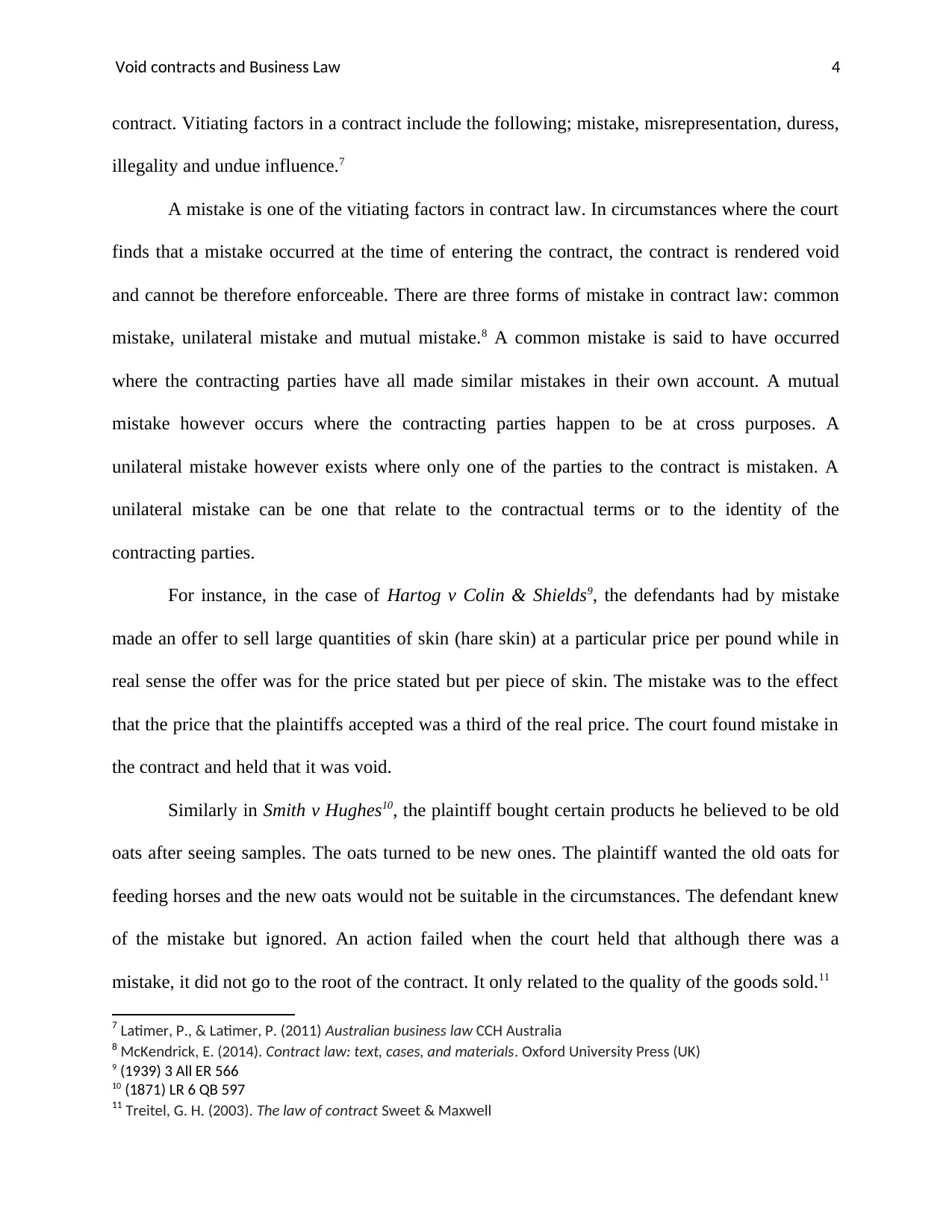
Void contracts and Business Law 4
contract. Vitiating factors in a contract include the following; mistake, misrepresentation, duress,
illegality and undue influence.7
A mistake is one of the vitiating factors in contract law. In circumstances where the court
finds that a mistake occurred at the time of entering the contract, the contract is rendered void
and cannot be therefore enforceable. There are three forms of mistake in contract law: common
mistake, unilateral mistake and mutual mistake.8 A common mistake is said to have occurred
where the contracting parties have all made similar mistakes in their own account. A mutual
mistake however occurs where the contracting parties happen to be at cross purposes. A
unilateral mistake however exists where only one of the parties to the contract is mistaken. A
unilateral mistake can be one that relate to the contractual terms or to the identity of the
contracting parties.
For instance, in the case of Hartog v Colin & Shields9, the defendants had by mistake
made an offer to sell large quantities of skin (hare skin) at a particular price per pound while in
real sense the offer was for the price stated but per piece of skin. The mistake was to the effect
that the price that the plaintiffs accepted was a third of the real price. The court found mistake in
the contract and held that it was void.
Similarly in Smith v Hughes10, the plaintiff bought certain products he believed to be old
oats after seeing samples. The oats turned to be new ones. The plaintiff wanted the old oats for
feeding horses and the new oats would not be suitable in the circumstances. The defendant knew
of the mistake but ignored. An action failed when the court held that although there was a
mistake, it did not go to the root of the contract. It only related to the quality of the goods sold.11
7 Latimer, P., & Latimer, P. (2011) Australian business law CCH Australia
8 McKendrick, E. (2014). Contract law: text, cases, and materials. Oxford University Press (UK)
9 (1939) 3 All ER 566
10 (1871) LR 6 QB 597
11 Treitel, G. H. (2003). The law of contract Sweet & Maxwell
contract. Vitiating factors in a contract include the following; mistake, misrepresentation, duress,
illegality and undue influence.7
A mistake is one of the vitiating factors in contract law. In circumstances where the court
finds that a mistake occurred at the time of entering the contract, the contract is rendered void
and cannot be therefore enforceable. There are three forms of mistake in contract law: common
mistake, unilateral mistake and mutual mistake.8 A common mistake is said to have occurred
where the contracting parties have all made similar mistakes in their own account. A mutual
mistake however occurs where the contracting parties happen to be at cross purposes. A
unilateral mistake however exists where only one of the parties to the contract is mistaken. A
unilateral mistake can be one that relate to the contractual terms or to the identity of the
contracting parties.
For instance, in the case of Hartog v Colin & Shields9, the defendants had by mistake
made an offer to sell large quantities of skin (hare skin) at a particular price per pound while in
real sense the offer was for the price stated but per piece of skin. The mistake was to the effect
that the price that the plaintiffs accepted was a third of the real price. The court found mistake in
the contract and held that it was void.
Similarly in Smith v Hughes10, the plaintiff bought certain products he believed to be old
oats after seeing samples. The oats turned to be new ones. The plaintiff wanted the old oats for
feeding horses and the new oats would not be suitable in the circumstances. The defendant knew
of the mistake but ignored. An action failed when the court held that although there was a
mistake, it did not go to the root of the contract. It only related to the quality of the goods sold.11
7 Latimer, P., & Latimer, P. (2011) Australian business law CCH Australia
8 McKendrick, E. (2014). Contract law: text, cases, and materials. Oxford University Press (UK)
9 (1939) 3 All ER 566
10 (1871) LR 6 QB 597
11 Treitel, G. H. (2003). The law of contract Sweet & Maxwell
Paraphrase This Document
Need a fresh take? Get an instant paraphrase of this document with our AI Paraphraser
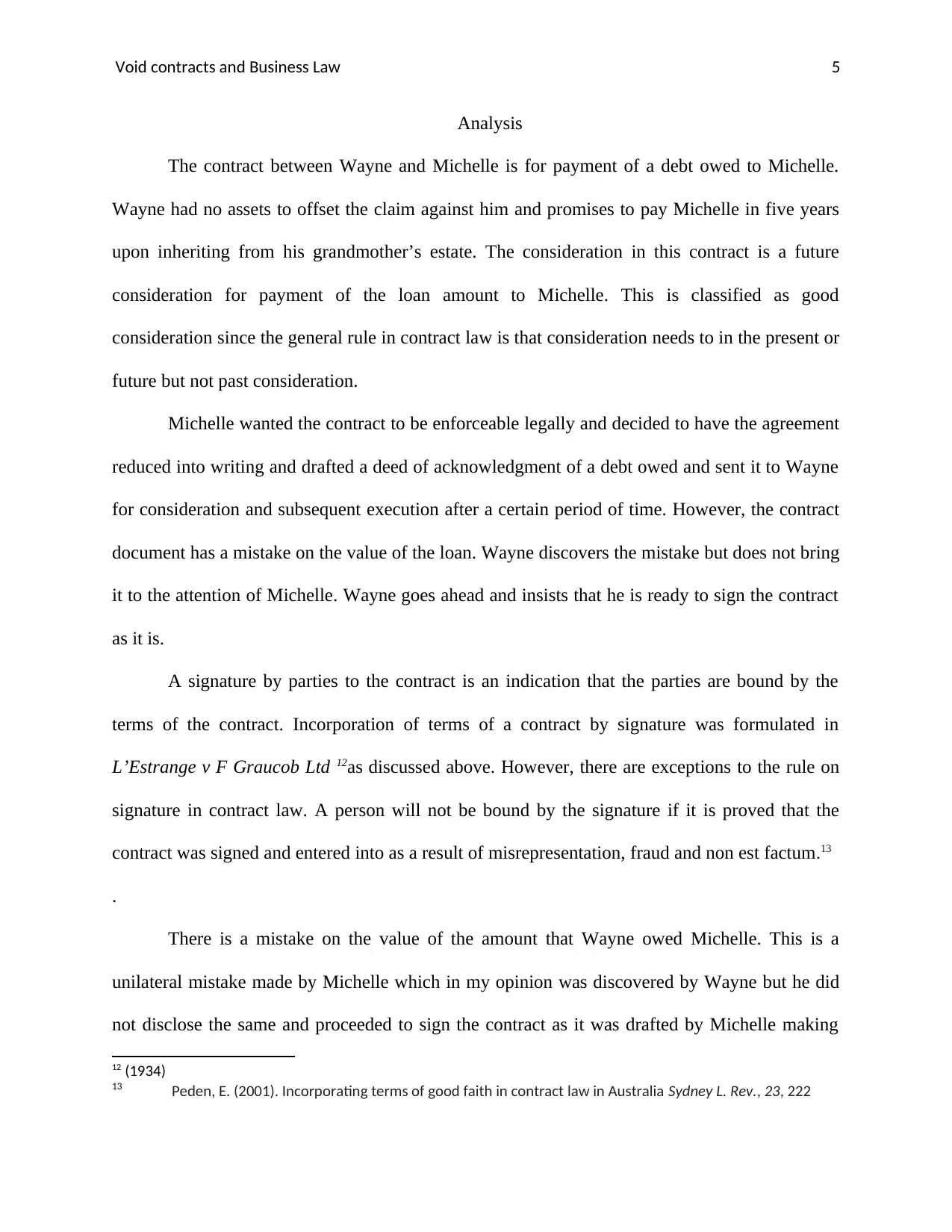
Void contracts and Business Law 5
Analysis
The contract between Wayne and Michelle is for payment of a debt owed to Michelle.
Wayne had no assets to offset the claim against him and promises to pay Michelle in five years
upon inheriting from his grandmother’s estate. The consideration in this contract is a future
consideration for payment of the loan amount to Michelle. This is classified as good
consideration since the general rule in contract law is that consideration needs to in the present or
future but not past consideration.
Michelle wanted the contract to be enforceable legally and decided to have the agreement
reduced into writing and drafted a deed of acknowledgment of a debt owed and sent it to Wayne
for consideration and subsequent execution after a certain period of time. However, the contract
document has a mistake on the value of the loan. Wayne discovers the mistake but does not bring
it to the attention of Michelle. Wayne goes ahead and insists that he is ready to sign the contract
as it is.
A signature by parties to the contract is an indication that the parties are bound by the
terms of the contract. Incorporation of terms of a contract by signature was formulated in
L’Estrange v F Graucob Ltd 12as discussed above. However, there are exceptions to the rule on
signature in contract law. A person will not be bound by the signature if it is proved that the
contract was signed and entered into as a result of misrepresentation, fraud and non est factum.13
.
There is a mistake on the value of the amount that Wayne owed Michelle. This is a
unilateral mistake made by Michelle which in my opinion was discovered by Wayne but he did
not disclose the same and proceeded to sign the contract as it was drafted by Michelle making
12 (1934)
13 Peden, E. (2001). Incorporating terms of good faith in contract law in Australia Sydney L. Rev., 23, 222
Analysis
The contract between Wayne and Michelle is for payment of a debt owed to Michelle.
Wayne had no assets to offset the claim against him and promises to pay Michelle in five years
upon inheriting from his grandmother’s estate. The consideration in this contract is a future
consideration for payment of the loan amount to Michelle. This is classified as good
consideration since the general rule in contract law is that consideration needs to in the present or
future but not past consideration.
Michelle wanted the contract to be enforceable legally and decided to have the agreement
reduced into writing and drafted a deed of acknowledgment of a debt owed and sent it to Wayne
for consideration and subsequent execution after a certain period of time. However, the contract
document has a mistake on the value of the loan. Wayne discovers the mistake but does not bring
it to the attention of Michelle. Wayne goes ahead and insists that he is ready to sign the contract
as it is.
A signature by parties to the contract is an indication that the parties are bound by the
terms of the contract. Incorporation of terms of a contract by signature was formulated in
L’Estrange v F Graucob Ltd 12as discussed above. However, there are exceptions to the rule on
signature in contract law. A person will not be bound by the signature if it is proved that the
contract was signed and entered into as a result of misrepresentation, fraud and non est factum.13
.
There is a mistake on the value of the amount that Wayne owed Michelle. This is a
unilateral mistake made by Michelle which in my opinion was discovered by Wayne but he did
not disclose the same and proceeded to sign the contract as it was drafted by Michelle making
12 (1934)
13 Peden, E. (2001). Incorporating terms of good faith in contract law in Australia Sydney L. Rev., 23, 222
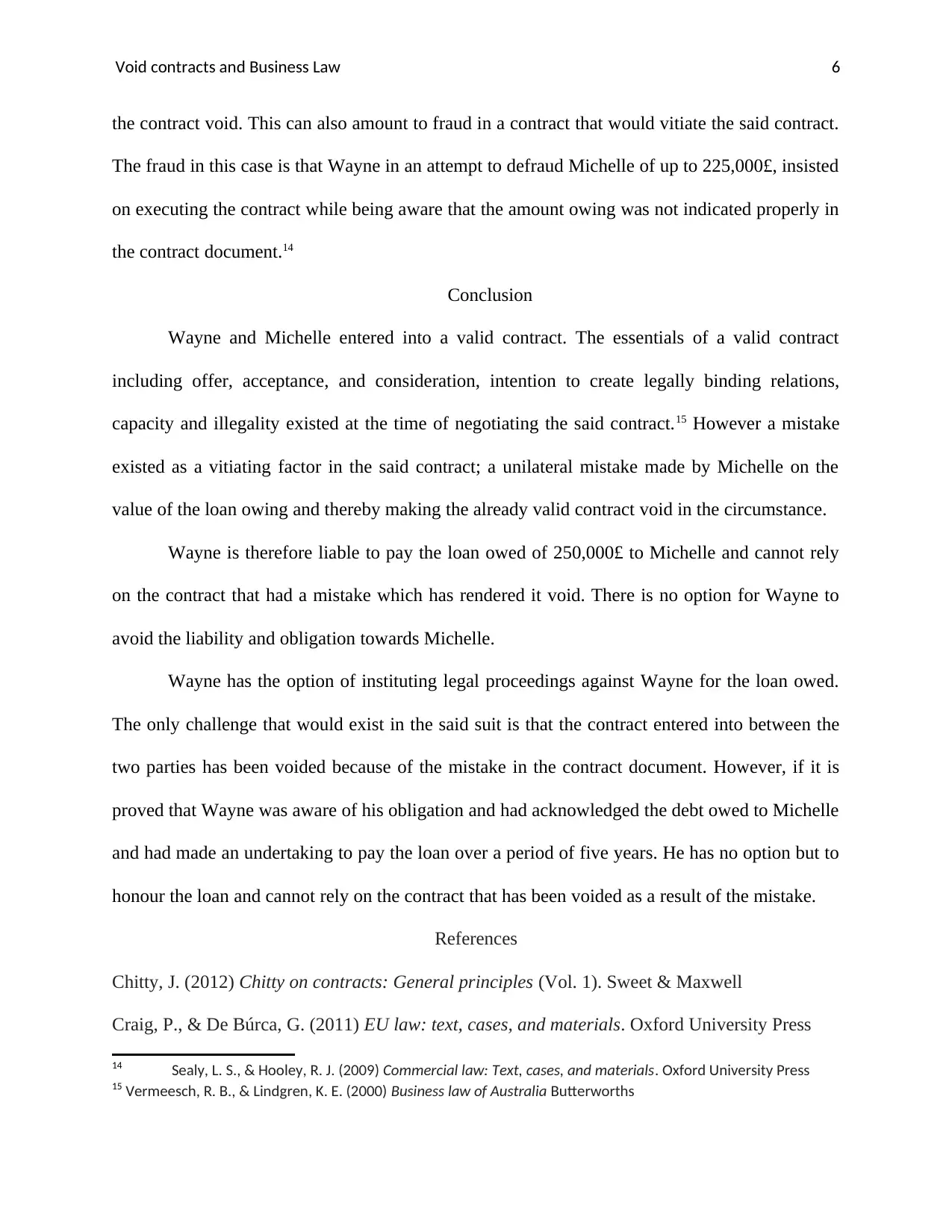
Void contracts and Business Law 6
the contract void. This can also amount to fraud in a contract that would vitiate the said contract.
The fraud in this case is that Wayne in an attempt to defraud Michelle of up to 225,000£, insisted
on executing the contract while being aware that the amount owing was not indicated properly in
the contract document.14
Conclusion
Wayne and Michelle entered into a valid contract. The essentials of a valid contract
including offer, acceptance, and consideration, intention to create legally binding relations,
capacity and illegality existed at the time of negotiating the said contract.15 However a mistake
existed as a vitiating factor in the said contract; a unilateral mistake made by Michelle on the
value of the loan owing and thereby making the already valid contract void in the circumstance.
Wayne is therefore liable to pay the loan owed of 250,000£ to Michelle and cannot rely
on the contract that had a mistake which has rendered it void. There is no option for Wayne to
avoid the liability and obligation towards Michelle.
Wayne has the option of instituting legal proceedings against Wayne for the loan owed.
The only challenge that would exist in the said suit is that the contract entered into between the
two parties has been voided because of the mistake in the contract document. However, if it is
proved that Wayne was aware of his obligation and had acknowledged the debt owed to Michelle
and had made an undertaking to pay the loan over a period of five years. He has no option but to
honour the loan and cannot rely on the contract that has been voided as a result of the mistake.
References
Chitty, J. (2012) Chitty on contracts: General principles (Vol. 1). Sweet & Maxwell
Craig, P., & De Búrca, G. (2011) EU law: text, cases, and materials. Oxford University Press
14 Sealy, L. S., & Hooley, R. J. (2009) Commercial law: Text, cases, and materials. Oxford University Press
15 Vermeesch, R. B., & Lindgren, K. E. (2000) Business law of Australia Butterworths
the contract void. This can also amount to fraud in a contract that would vitiate the said contract.
The fraud in this case is that Wayne in an attempt to defraud Michelle of up to 225,000£, insisted
on executing the contract while being aware that the amount owing was not indicated properly in
the contract document.14
Conclusion
Wayne and Michelle entered into a valid contract. The essentials of a valid contract
including offer, acceptance, and consideration, intention to create legally binding relations,
capacity and illegality existed at the time of negotiating the said contract.15 However a mistake
existed as a vitiating factor in the said contract; a unilateral mistake made by Michelle on the
value of the loan owing and thereby making the already valid contract void in the circumstance.
Wayne is therefore liable to pay the loan owed of 250,000£ to Michelle and cannot rely
on the contract that had a mistake which has rendered it void. There is no option for Wayne to
avoid the liability and obligation towards Michelle.
Wayne has the option of instituting legal proceedings against Wayne for the loan owed.
The only challenge that would exist in the said suit is that the contract entered into between the
two parties has been voided because of the mistake in the contract document. However, if it is
proved that Wayne was aware of his obligation and had acknowledged the debt owed to Michelle
and had made an undertaking to pay the loan over a period of five years. He has no option but to
honour the loan and cannot rely on the contract that has been voided as a result of the mistake.
References
Chitty, J. (2012) Chitty on contracts: General principles (Vol. 1). Sweet & Maxwell
Craig, P., & De Búrca, G. (2011) EU law: text, cases, and materials. Oxford University Press
14 Sealy, L. S., & Hooley, R. J. (2009) Commercial law: Text, cases, and materials. Oxford University Press
15 Vermeesch, R. B., & Lindgren, K. E. (2000) Business law of Australia Butterworths
⊘ This is a preview!⊘
Do you want full access?
Subscribe today to unlock all pages.

Trusted by 1+ million students worldwide
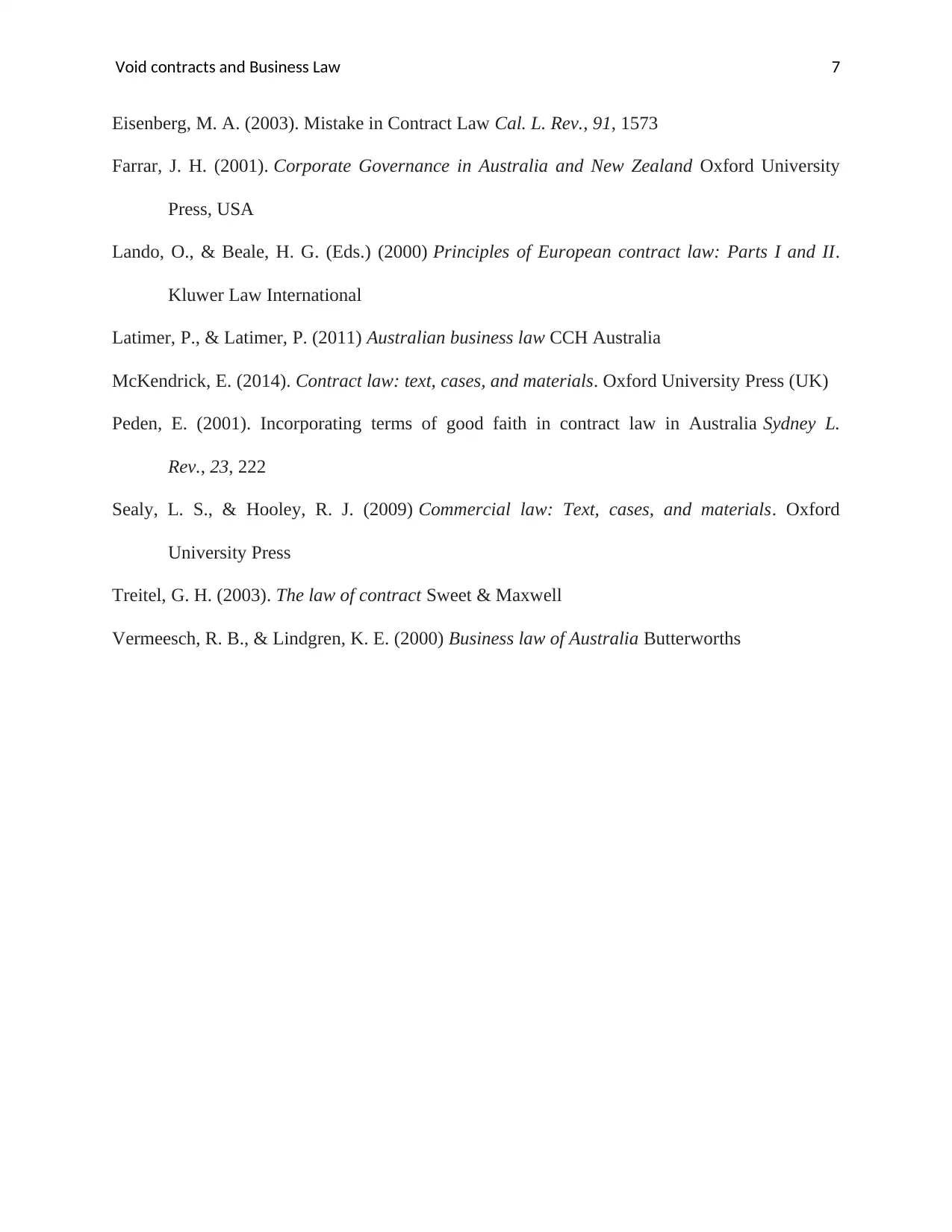
Void contracts and Business Law 7
Eisenberg, M. A. (2003). Mistake in Contract Law Cal. L. Rev., 91, 1573
Farrar, J. H. (2001). Corporate Governance in Australia and New Zealand Oxford University
Press, USA
Lando, O., & Beale, H. G. (Eds.) (2000) Principles of European contract law: Parts I and II.
Kluwer Law International
Latimer, P., & Latimer, P. (2011) Australian business law CCH Australia
McKendrick, E. (2014). Contract law: text, cases, and materials. Oxford University Press (UK)
Peden, E. (2001). Incorporating terms of good faith in contract law in Australia Sydney L.
Rev., 23, 222
Sealy, L. S., & Hooley, R. J. (2009) Commercial law: Text, cases, and materials. Oxford
University Press
Treitel, G. H. (2003). The law of contract Sweet & Maxwell
Vermeesch, R. B., & Lindgren, K. E. (2000) Business law of Australia Butterworths
Eisenberg, M. A. (2003). Mistake in Contract Law Cal. L. Rev., 91, 1573
Farrar, J. H. (2001). Corporate Governance in Australia and New Zealand Oxford University
Press, USA
Lando, O., & Beale, H. G. (Eds.) (2000) Principles of European contract law: Parts I and II.
Kluwer Law International
Latimer, P., & Latimer, P. (2011) Australian business law CCH Australia
McKendrick, E. (2014). Contract law: text, cases, and materials. Oxford University Press (UK)
Peden, E. (2001). Incorporating terms of good faith in contract law in Australia Sydney L.
Rev., 23, 222
Sealy, L. S., & Hooley, R. J. (2009) Commercial law: Text, cases, and materials. Oxford
University Press
Treitel, G. H. (2003). The law of contract Sweet & Maxwell
Vermeesch, R. B., & Lindgren, K. E. (2000) Business law of Australia Butterworths
1 out of 7
Related Documents
Your All-in-One AI-Powered Toolkit for Academic Success.
+13062052269
info@desklib.com
Available 24*7 on WhatsApp / Email
![[object Object]](/_next/static/media/star-bottom.7253800d.svg)
Unlock your academic potential
Copyright © 2020–2026 A2Z Services. All Rights Reserved. Developed and managed by ZUCOL.





